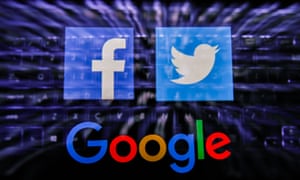Extract from The Guardian
Poll also suggests 60% agree tech giants have too much power and should pay media outlets for distributing their news content
A majority of Australians want the government to regulate the digital behemoths, and voters also support moves to make Facebook and Google pay for mainstream media content, according to the Guardian Essential poll.
The latest fortnightly survey of 1,034 voters shows three in five Australians (59%) agree that Facebook and Google have too much power and should be regulated by the government, with 13% of respondents disagreeing with that proposition.
A similar percentage (57%) believes Facebook and Google should be required to pay media outlets for distributing their news content, with 15% disagreeing.
Voters were also asked whether websites should face limitations on the amount of personal information about users they collect (73% agreed with that proposition), and whether they thought systems that monitor web activity to target advertising and communications to users should be illegal (63% supported that idea).
The Morrison government is expected to use the final parliamentary sitting fortnight to introduce legislation giving effect to a new code forcing Google and Facebook to pay for the value they receive from the distribution of Australian journalism.
The proposal is expected to be introduced to parliament next week.
Responses to questions in the Guardian Essential poll suggest men are more worried than women about the power of the digital platforms. Government regulation as a corrective was supported by a majority of Coalition (65%), Labor (58%) and Greens (60%) voters, and people intending to vote for someone other than the major parties (64%).
The proposal to make the platforms pay for news content was also backed by a majority of voters across the cohorts (64% of Coalition voters, 53% Labor, 56% Greens, and 54% of people intending to vote for someone other than the major parties).
The proposed code aims to address the imbalance in bargaining power between the news media and tech giants, and force Google and Facebook to pay for the value they receive from the distribution of Australian journalism.
It would also require Google and Facebook to provide media companies with information on changes that might affect their traffic, such as alterations to news rankings or the search algorithm. If they failed to comply, they could be forced to pay hundreds of millions of dollars in fines.
The original draft of the code excluded the publicly funded broadcasters ABC and SBS. The recent addition of the public broadcasters is one of the significant changes treasurer Josh Frydenberg made to the mandatory news code ahead of its tabling next week.
Labor, the Greens and several crossbenchers pushed the Coalition to include the ABC and SBS in the interests of helping gain broad cross-party support for the legislation.
On Thursday, the Nobel Prize-winning American economist, Joseph Stiglitz and Anya Schiffrin, director of technology, media and communications at Columbia University, will participate in a webinar organised by the Australia Institute to consider Australia’s media bargaining code.
Peter Lewis, the director of Essential Media Communications, and director of the Australia Institute’s Centre for Responsible Technology, said the results of this fortnight’s survey showed voters would support proactive moves by governments to regulate the platforms.
“What is heartening is that there is growing consensus across the political spectrum that redressing the power imbalance with these platforms is good for democracy,” Lewis said.
“With politics around the globe falling prey to disinformation, division and distortion through social media, this is a critical intervention to maintain viable, independent and diverse media outlets”.
Lewis said the Australian proposal was a first, and an important one. By pursuing the code, the Australian parliament would “establish a world-leading framework to sustain the public square”.

No comments:
Post a Comment